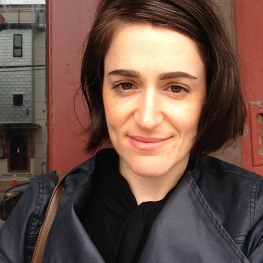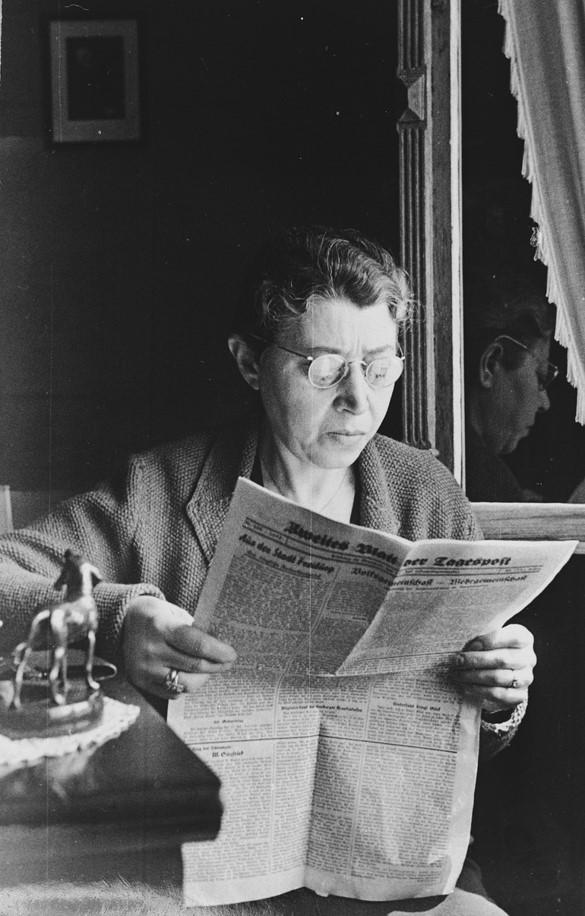Katz Center Fellow Jacqueline Vayntrub on the Revitalization of Philology, Biblical Poetics, and Generational Dynamics in Biblical Authorship
This blog post is part of a series focused on the research of current fellows. In this edition, Katz Center Director Steven Weitzman sits down with Jacqueline Vayntrub, whose work examines practices of knowledge transmission in biblical and ancient Near Eastern and Mediterranean narratives.
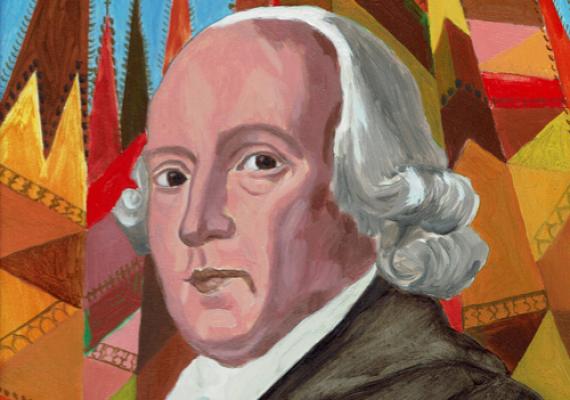
Steven P. Weitzman (SPW): It’s a distinctive pleasure to have this chance to ask you a few questions about your work because you and I have tackled some overlapping areas in our research and share some interpretive sensibilities, and yet you think in ways that go beyond the limits of my thinking. I appreciate having my mind challenged and opened in that way.
Your recently published book, Beyond Orality, begins with a quote from Johann Gottfried Herder that all poetry has its origin in speech. What did he mean by that, and how does your work challenge that claim as it applies to biblical poetry?
Jacqueline Vayntrub (JV): It’s a privilege to speak with you—and in particular, I don’t think enough of these conversations happen in our field, but I think we stand to learn much by looking at our objects of study through the questions of others. One interesting paradox of the classic model of the “biblical philologist”—the scholar of biblical texts and language—is that this model is marked by a deeply held value for uncovering the text’s singular origin story. But at the same time, this value is accompanied by the goal of arriving at the “true” or “singular” reading of the text. This often means that one’s interpretation is construed in competitive terms, to render itself superior to all previous readings. This kind of socialization makes it both difficult to recognize the effect one’s own time and place has on their work—how we too are products of history—and to see the value in the intellectual engagements others have had with these same texts, to understand where they are coming from.
I decided to open the book with Herder’s voice because, recognized or not, his thinking on ancient textualized language and what it can tell us about culture has had an outsized effect not only on our area of study, but on other fields such as philosophy, comparative literature, and history, to name a few. And, in fact, the Hebrew Bible is a unique locus of inquiry in that its study leads us down varied paths. It leads us from the ancient Near East and the birth of writing, to the role of the Bible’s interpretation in early modern self-fashioning and political theory, to contemporary challenges, to orientalism and colonialism. Herder’s statement, that all poetry has its origins in speech, captures much of the Bible’s role in a persistent way of thinking about the deep past—as both powerful in its truth but primitive in its articulation—and how we consider ourselves in relation to that past. Herder’s statement is also complicated by the fact that we do not have transcripts of ancient Israelite singing but a textualized anthology. And yet Herder’s statement is also profoundly resonant for a reading of the biblical text, since the narratives in the Hebrew Bible have painted a picture of their own past as one punctuated by poetry and song. The task I wanted to set before me was to reconcile these dissonant phenomena—the perception of poetry as a kind of emotive, less rational literature that comes before the development of prose; biblical poetry as it comes to us in written texts; and the role poetry plays as character speech in the Hebrew Bible.
SPW: In my work on related topics, I was under the sway of my dissertation advisor James Kugel, who challenged how scholars distinguished between prose and poetry in the Bible, and argued that the application of the category of poetry to the Bible is anachronistic, a projection of a later Hellenized literary category onto biblical texts that has distorted what scholars and translators understand them to mean. Do you share his challenge to the idea of biblical poetry? If you accept poetry as a non-anachronistic category for the Bible, what is it exactly? What are its defining characteristics or what distinguishes it from prose?
JV: Kugel’s observation in that regard is a rather important one. The study of biblical poetry has long relied on Greek-inflected literary categories, and yet genre categories and rhetorical principles native to the Greek tradition do not correspond neatly to many of the categories and principles that underlie the biblical texts. But perhaps the question of what in the Bible is poetry and what is prose obscures a more fundamental problem that we face as biblical scholars. The language we speak as scholars is deeply indebted to forms of intellectual expression that go back to fifth century BCE Athens. One of my goals in the book was to show how our reliance on this intellectual tradition fails to account for the different ways in which the biblical literary tradition reflected upon itself in its compositional practices. Biblical literature did not develop a theoretical and critical language—or at least, a language that is recognizable from a Greek-inflected system of literary categorization and evaluation. For that reason, the ways in which biblical authors theorized and challenged generic boundaries will necessarily look distinct from how Plato or Aristotle theorized their own literary tradition. Instead of developing an external critical apparatus, the biblical authors participated in literary criticism within their craft, reshaping genres, themes, devices, and patterns of expression. A deeper understanding of the biblical literary tradition can be gained through mapping rhetorical strategies across genres, including poetry, prophecy, wisdom, and law. A simple answer to the question of what characterizes biblical poetry is that those texts we frequently identify as poetry, with its recognizable rhythm and patterns of organization, are speeches attributed to characters and often given in their narrated voice. From that point, the questions—at least from my perspective—can widen from “How do these texts fit into our literary categories?” to “Why do these texts look the way they do?” and “Why is a character’s voice an important way to frame certain kinds of literature?” When you move towards those kinds of questions, you’ve created the distance necessary to defamiliarize the text and the world that created it—you allow antiquity to come back to life in a fuller and clearer way, not molded by our own values and assumptions.
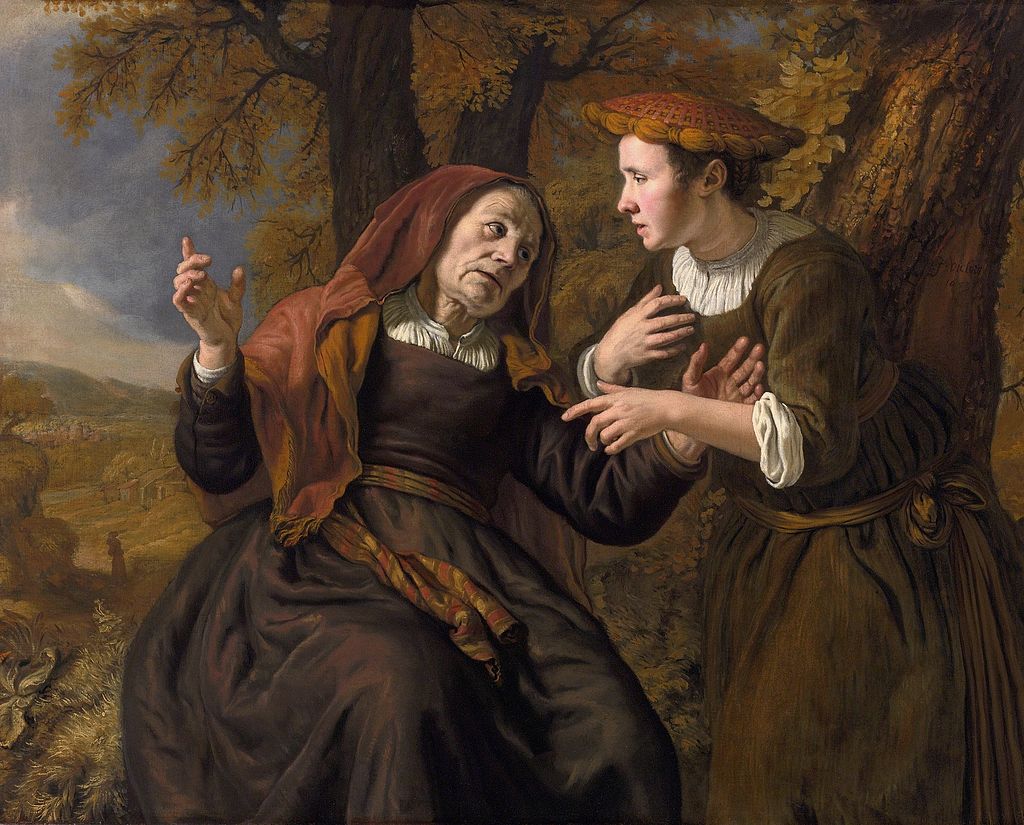 SPW: Your own approach, as I understand it, pursues a “native” understanding of biblical poetry aiming to illumine how biblical authors or editors themselves comprehended it. Can you give us a sense of how you tease out the meaning of poetic texts from the perspective of the composers or editors who incorporated it into their work?
SPW: Your own approach, as I understand it, pursues a “native” understanding of biblical poetry aiming to illumine how biblical authors or editors themselves comprehended it. Can you give us a sense of how you tease out the meaning of poetic texts from the perspective of the composers or editors who incorporated it into their work?
JV: So what I mean by a “native” understanding of biblical texts—not just poetry but literary composition more generally—is the acknowledgement that all art, all literary creations, all textual products have a logic of their own, a theory of their own existence. Some literary traditions bring along corresponding traditions of literary debate, critique, and theorizing that can give some insight into a text’s internal logic. But since we don’t have this kind of explicit discourse for our texts, we look within the texts for this conceptual vocabulary. To be fair, I think it’s also important to recognize that this is not really a novel approach: many literarily inclined scholars pursue a “native” understanding of the biblical texts. This was a central aspect to your own study of “poetic closure” in your book on how poetry and prose interact in biblical composition. I would say that the main difference between what others have done and what I am pursuing is simply acknowledging and systematizing the task.
I actually have a fun example that comes from narrative composition connected to my current project on how biblical authors think about intergenerational dynamics and the transmission of objects, responsibility, reward, punishment, and texts. There’s a narrative pattern that one can find in biblical narrative (as well as in Ugaritic narrative poetry) that has been called “command and fulfillment.” In this pattern, a character will command another character to perform a set of actions—it’s usually a hierarchically superior character who does the commanding like a god or a father, and a subordinate who does the performing—and the subordinate character will (usually) perform these commands faithfully. The literary pattern that demonstrates the subordinate character’s “fulfillment” of the command of their superior by using the exact same wording of the command in the description of its performance. This narrative pattern might seem like a tedious quirk of the literary culture—I mean, who wants to see the repetition of the same words over and over again when one is anticipating the unfolding events of a story? But what I noticed about this narrative pattern is that it also happens in stories that have something to do with concepts of hierarchy, obedience, and inter-generational dynamics. There are some intriguing places where this narrative pattern is played with, and to great effect. I have published on the transmission of Isaac’s deathbed blessing to Jacob in Genesis 27 and Naomi’s assumption of the patriarchal role in her instruction of her daughter-in-law in the book of Ruth. Right now I’m looking closely at the episode of Saul’s disobedience and loss of the kingship in 1 Samuel 15. I’m teasing out a connection between how these stories are narrated and cultural beliefs of how “things” and “ideas” pass from one person to another.
SPW: In addition to challenging how scholars think about biblical poetry, you are also challenging them to think in new ways about philology as a scholarly approach to ancient texts. What is wrong with philology as it has conventionally been practiced in biblical studies? Can you share with us your efforts to promote a new approach to philology within the field, what you have in mind, and what you mean to accomplish?
JV: I’ve been involved with a couple of efforts to rethink scholarly approaches to ancient texts. My first initiative started around 2011, when I was still in graduate school at the University of Chicago in a Northwest Semitic Philology doctoral program—a program housed in the department of Near Eastern Languages and Civilizations (NELC) and led by my advisor Dennis Pardee. Students in this program were not required to take courses in the Divinity school next door, but of course a number of us, including myself, took many courses there as well. At the end of my coursework, a newly formed program—or perhaps more accurately, a newly renewed doctoral program—Bible and Ancient Near East, a joint program between NELC and the Divinity school was established by Jeffrey Stackert, modeled in many ways on the doctoral program where he had been a student at Brandeis. Since I had completed my coursework already, I had to make a decision as to whether I would remain in Northwest Semitic Philology or to join this newly formed program. I understood the important reasons for establishing this new program: to integrate training in Hebrew Bible at the divinity school with instruction in the NELC department, and crucially, to make sure that a program in Semitic Philology did not become a strategy for students to avoid exposure to higher criticism through focusing only on the languages and not the compositional problems posed by the texts. I nevertheless decided, for a number of reasons, to remain in Northwest Semitic Philology. Some of those reasons were practical. But one dimension of my decision involved my own intellectual identity as a philologist. I began to examine what this would mean for me to consciously choose a Philology program over a Bible and Ancient Near East Program. Surely, in terms of the coursework I had done, there was very little distinction between these two programs—it was more a matter of titles and slightly different comprehensive exam configurations. For me it had to do with how I was centering my inquiry of the texts: through language and its patterning. At this time, which was a couple years before James Turner published his history of philology, I started to read more deeply into the history of philology, which is something that is not a common practice among philologists. Through reading and reflection, it occurred to me that philologists produce knowledge without an explicitly stated method—that this method was a self-professed non-method. I have discussed what I call the non-method method of philology elsewhere—this is an idea that is particularly seen in Vico’s New Science, a work which fleshed out a set of principles underlying the philological discipline.
It occurred to me then, with dwindling student enrollment in humanities courses and programs, and budget cuts threatened all around, that you have to justify your field of study and the work you do in it. I knew that without explanation of what we do as philologists, without justifying the value of this work, and ultimately, without self-reflection on the inequalities it historically produced, philology was not going to hang around for much longer. At this time I was also reading Sheldon Pollock’s essay in Critical Inquiry, “Future Philology,” and thinking through his description of philology as the study of language in its textual products. I decided that the time was right to work out these ideas—to historicize not only the primary text, but the readers themselves—in the Society of Biblical Literature (SBL). In putting together the ideas animating such a program unit, which Jeremy Hutton helped us flesh out fully after our initial rejection and allowed us to have this platform for over four years now, I intended to work out a new kind of philology that was self-reflective. Philology as it is classically conceived is the close study of ancient language as presented in their textual products and a recovery of the world-views encoded and emergent in these textual products. Our innovation was that, crucially, papers in this program unit would reflect critically upon the intellectual frameworks of the reader that are brought to bear in philological practice—to be interdisciplinary in our readings and recoveries of these ancient world-views and intellectual values and to be simultaneously meta-critical in its practice.
I actually remember the first panel at SBL, with really thoughtful, creative papers but such low attendance. I think maybe the same number of people in the panel were in the audience. Ed Greenstein, who was one of the panelists, saw the disappointment on my face and encouraged me. He said that this is how great initiatives start, that I should keep at it, that interest would grow as people understood what we were all about. And he was right, I kept at it, and as the years went on we started to get a lot more interest in our programming, and some of it from graduate students, which was really exciting for me. That’s the future.
Building on the success of the Philology in Hebrew Studies program unit at the SBL, this past year, Eva Mroczek (UC Davis), David Lambert (UNC Chapel Hill), Laura Quick (Oxford), and I decided to launch an international working group, Renewed Philology, with an advisory board and website as a way of systematizing and publicizing our efforts through workshops and conferences. We’ve had a few events under the mantle of this working group (last year Laura Quick and I organized a conference at Princeton “Legendary Characters: Attribution and Personhood in Ancient Judaism”), and edited a special issue of the journal Hebrew Bible and Ancient Israel on Philology and Gender, along with another member of the Philology in Hebrew Studies committee, Ingrid Lilly. We are currently thinking about long-term goals and what might make a lasting impact on the field, and I think all of us involved in this project feel strongly about empowering early career scholars and graduate students to continue this work. Stay tuned!
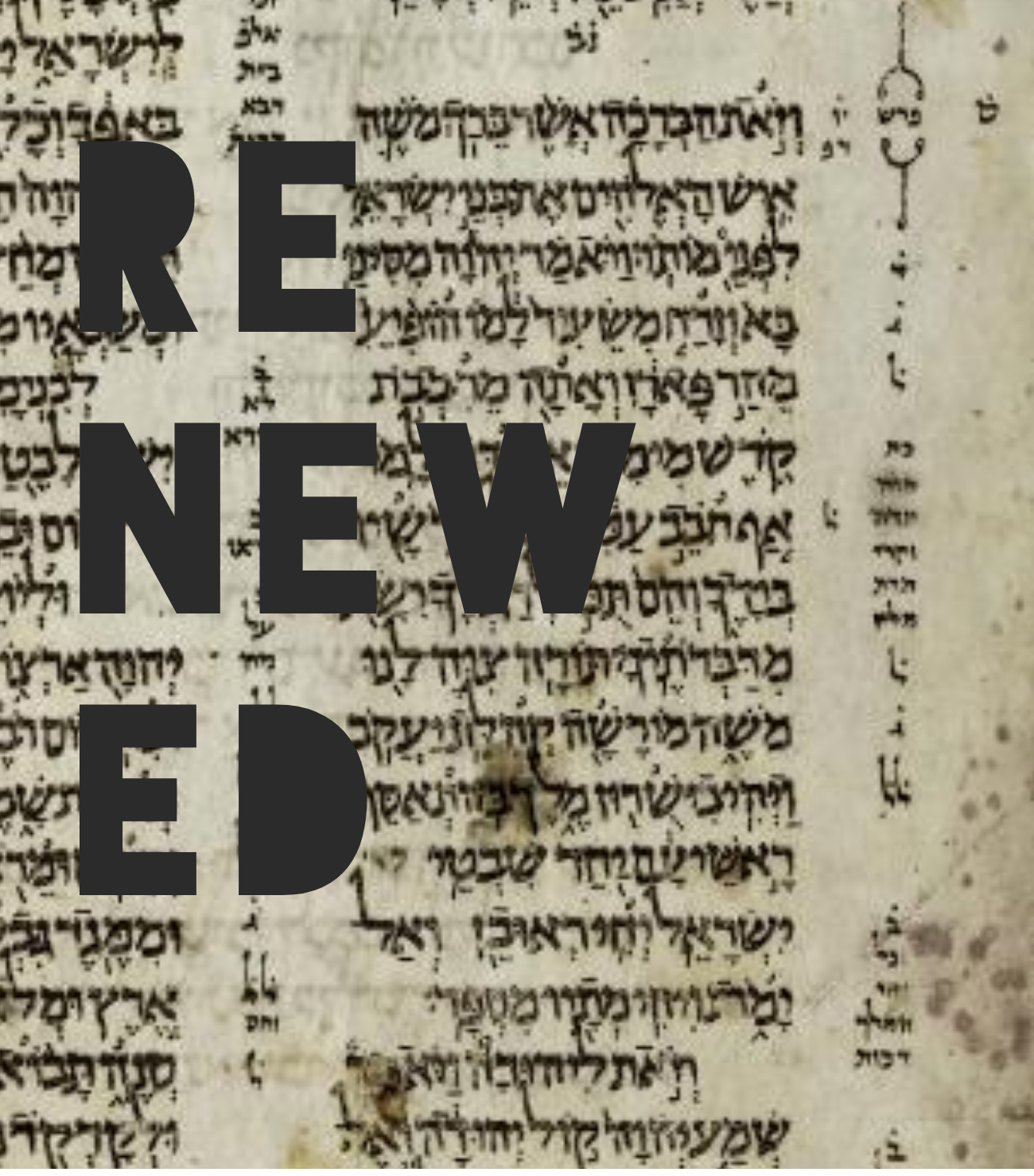 SPW: Clearly there are many dimensions to your work since we haven't even gotten to the research project that you are here at the Katz Center to pursue. Can you tell us a little about that and where it’s headed?
SPW: Clearly there are many dimensions to your work since we haven't even gotten to the research project that you are here at the Katz Center to pursue. Can you tell us a little about that and where it’s headed?
JV: At the Katz Center this year I’m investigating how biblical authors thought about inter-generational dynamics—their “theories” about transmission—and how these theories manifest themselves in their narrative patterns, poetics, and compositional strategies. This project came directly out of how I was thinking about biblical poetry in Beyond Orality. The importance of the embodied voice of identifiable, legendary speakers has not only shaped the way in which poetry appears in our texts. Voice also plays a significant role structuring discourses of transmission and survival beyond bodily death. Some of my recent essays (“Transmission and Mortal Anxiety in the Tale of Aqhat,” “Ecclesiastes and the Problem of Transmission in Biblical Literature,” and “Like Father, Like Son: Theorizing Transmission in Biblical and Ancient Near Eastern Literature”) explore the rhetorical role the first person voice plays. I relate the use of the “I” voice in biblical speech-making to the configuration of other literary genres like deathbed testaments and mortuary inscriptions. I was struck by how in both the genre of testament and in monumental inscription, the first person seems to rhetorically represent the speaker’s voice. And by extension, a component of the person—their voice, their name, their biography, their personhood—could be understood as preserved in the medium of the text. In those essays, I focused on the intersection of compositional structure and the textual medium, and looked to uncover meaningful connections between the literary presentation of the voice and its staying power in these texts.
The project comes from my persistent interest in how literary compositions embed concepts of mortality, meaning-making, and the self. For the biblical authors, the idea of life after death was inextricably tied to the family. The dead continued to exist in the sense of responsibility of the living. When Jacob commanded his son Joseph to bring his body out of Egypt and bury him with his ancestors in Gen 47:29, the command is to “be devoted and faithful” to Jacob. Post-mortem acts ensured the family’s stability from one generation to the next. The son, who cared for his father and succeeded him would, in turn, be cared for by his own son, who would succeed him. The phenomenon of succession in the Hebrew Bible and how it is connected to mortuary practices is an ongoing project in scholarship. But what I found to be missing in the scholarly literature was a broad synthesis of how these practices and the ideas behind them shaped biblical wisdom and narrative. What seem to be otherwise disparate ideas about, say, inheritance, divine reward and punishment, instruction, and scribal values actually seem to be of a piece. So I’m looking across genres to recover a complex of ideas on kinship, its hierarchical and gendered dimensions, and how these relationships configure the movement and displacement of material objects, responsibilities, speech, and texts from one generation to the next.
SPW: If you could invite to a conversation three biblical scholars, living or dead, to speak with or argue with, who would they be?
JV: Ah! This is a hard one. I have to say now that I’m defining “biblical scholar” expansively. The first person I’d invite is Leah Goldberg, a great Hebrew poet who was herself trained in Semitic Philology in Germany. She straddled the worlds of scholarship and art, and I’d like to hear more about how she understood biblical poetry and literary art in relation to her own poetry. Obviously, I’m going to invite Spinoza to the party, because I’m sure those would be fun arguments. Finally, I’m going to invite Ben Sira, because he had his own responses to biblical composition and literary traditions, and I want to find out what all that misogyny was about.
